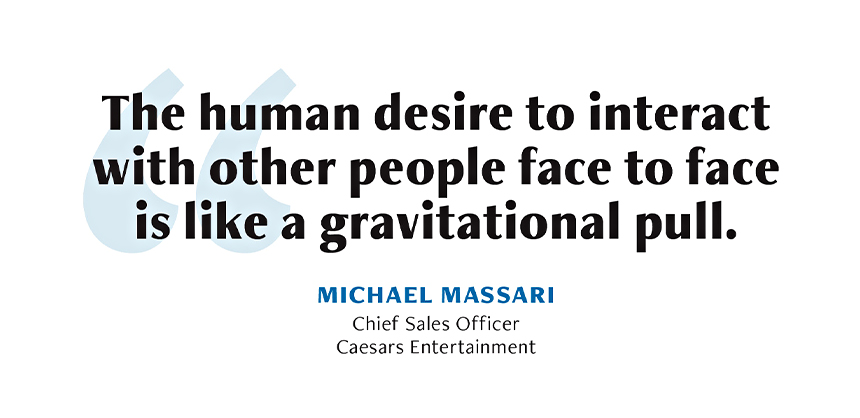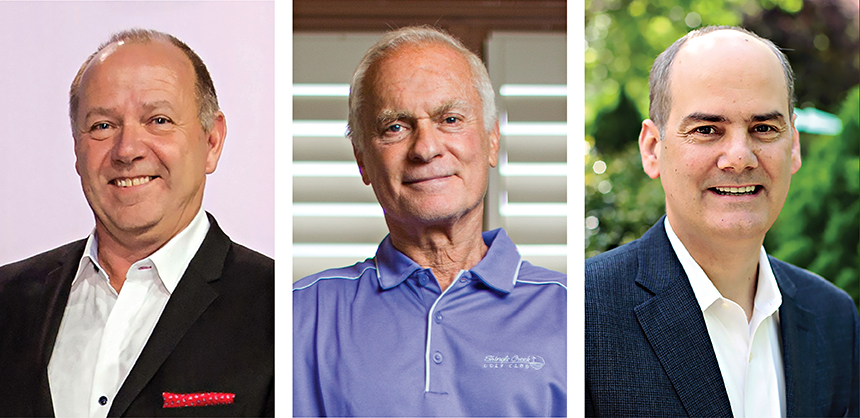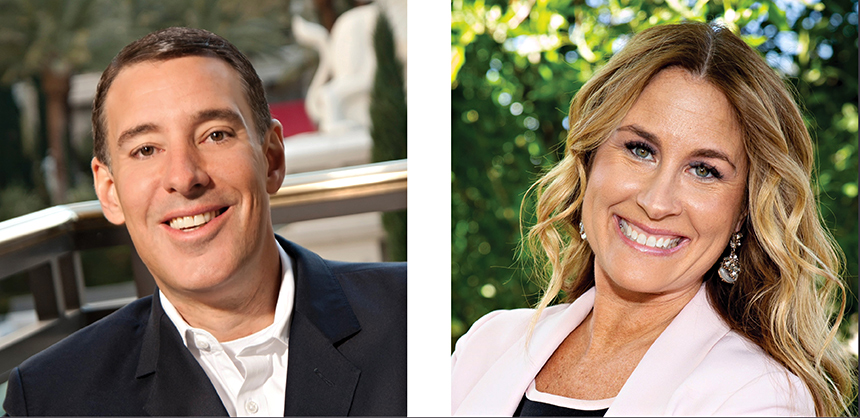Moving ForwardJune 24, 2020
Industry Executives Weigh In On The Future After COVID-19 By Rachel GalvinMoving Forward
Industry Executives Weigh In On The Future After COVID-19
Is the meetings business as we have known it changed forever? Will we operate within a new normal, or will there be a time post-COVID-19 when we can all get back to business in the way we always have? These questions are at the forefront for meeting planners, and hotel and resort management, as they begin reopening properties at this unprecedented time. Industry leaders weigh in on how they have been coping with the pandemic, what steps they have taken to ensure employee and attendee safety, and what they expect to happen in the future.
Employee Impact
When faced with ever-tightening restrictions, some resorts and hotels were forced to furlough employees while others were able to have them work from home or stay working on a limited basis.
“We were very fortunate that we were able to keep our sales teams intact throughout the closures to continue communicating closely with clients and plan for upcoming events,” says Stephanie Glanzer, CMP, SVP and chief sales officer of MGM Resorts International.
“We staff our hotels according to business demand and, unfortunately, we are unable to keep our entire workforce busy right now. Our associates are the heart of our business, and we’re working diligently to minimize the impact for them,” says Dan Surette, SVP and chief sales officer of Omni Hotels & Resorts.
“In the early stages, we instituted telework wherever possible,” says Harris Rosen, president and COO of Rosen Hotels & Resorts. “We did proceed with a temporary furlough for some of our associates during the severe downturn in our enterprise. We were able to continue to pay salaried associates at reduced rates in an effort to ensure that they would remain safe and aware of how much we value their contributions to the organization. Our intent is to have them return as we enter into a phased reopening based upon the level of consumer confidence and occupancy.”
When employees do come back, they will find themselves undergoing a series of processes to ensure they are healthy enough to return. Michael Massari, chief sales officer of Caesars Entertainment, says their employees fill out a questionnaire in which they list whether they have any of the symptoms or have been around someone who has had COVID-19. If they are symptomatic or have had interaction with someone who is, then they undergo a COVID-19 test. If they test positive, they are sent home to quarantine, but if negative, they go back to work. They also get their temperature checked daily before entry and follow other safety procedures, such as wearing masks.

From left: Steve Enselein, Hyatt Hotels Corporation; Harris Rosen, Rosen Hotels & Resorts; Dan Surette, Omni Hotels & Resorts
Keeping it Clean
In addition to figuring out the best way to maintain their workforce, the executives had to determine the best way to keep returning attendees and guests safe, adding that new sanitation and safety protocols were implemented.
Steve Enselein, SVP of Events at Hyatt Hotels Corporation, says meeting planners can do a virtual tour to see the property ahead of time and how meeting spaces will look under social distancing guidelines. Attendees can bypass the front desk and use Hyatt Mobile Entry to access their room and other public spaces utilizing their mobile device. Hotels are cleaning more frequently utilizing hospital grade disinfectants on all high-touch surfaces, in addition to adding hand sanitizer stations at the entrance of all of the venues and during meal service. Masks and gloves will be made available for attendees and items such as pens and pads that cannot easily be sanitized will be eliminated. In addition, Hyatt has designated at least one Hygiene and Wellbeing Leader at every hotel to ensure their new protocols are being met. He says that they are also, “evolving banquet menus to provide planners with more options, such as individually pre-packaged items and plated meals rather than buffets.”
Rosen says that they also reimagined their buffets utilizing social distancing and servers, and implemented electrostatic spraying in guest rooms after checkout, as well as constantly cleaning high-touch areas. He adds, “We adhere to all social distancing guidelines and have installed floor markers where appropriate throughout our properties. We have strategically placed hundreds of hand sanitizing stations. Plexiglas shields are in place, most notably at the front desk, cashier and hostess stations.”
Glanzer adds, “We have implemented a comprehensive Seven-Point Safety Plan that includes numerous health and safety protocols throughout our properties to ensure guests have a safer, more comfortable experience as they return to our resorts, including custom handwashing stations on the casino floors, Plexiglas barriers at the front desk and at gaming tables, and spacing of tables throughout our food and beverage outlets. In our guest rooms, attendants have been trained on enhanced cleaning and disinfection protocols. Upon check-out, guest rooms will be thoroughly cleaned and disinfected and seals are placed on the doors so guests know their room has been sanitized before they enter. We are also removing all unnecessary items, such as throw pillows and magazines, and other printed collateral, to streamline the room.” Additionally, she says each guest will receive an amenity kit in their rooms with two face masks, a bottle of hand sanitizer and a device that opens doors with a hook, and a stylus to push buttons to minimize the amount of touching.
She sees digital innovation coming out of this crisis to be a positive. “Hotel guests now have the option of contactless check-in where they can download the MGM app and receive a digital key that allows them direct access to their rooms, bypassing the front desk altogether. We have also implemented a new digital experience throughout our restaurants. When guests arrive, they will scan a QR code that puts them into a virtual queue and they will receive a text when their table is ready. When guests are seated, they will be presented with another QR code that leads them to a digital menu that replaces the standard physical menu which will still be available upon request.”
Massari says, “Literally, we spent the last 12 weeks going through every procedure on our properties and modifying them given the current situation. So I think what you’ll find is that almost every procedure through the entire property has been changed or modified – the amount of times we clean our surfaces, the amount of times that employees wash their hands, how often or whether we go into occupied spaces like guest rooms.”
“We have increased the frequency of sanitation of high-touch surfaces and public areas with EPA-certified cleansers that are CDC-compliant,” Surette says. “High-touch areas include the front desk counter, guest room keys, elevator buttons, restrooms and door handles. Additional sanitizing stations are placed throughout the hotel in public spaces for guests and associates to access easily, and use regularly. Our housekeeping associates are exercising additional precautions when cleaning and sanitizing all guest rooms each day. For requested items, including in-room dining, housekeeping attendants will deliver with a contactless procedure by placing the item outside the door. Elevated disinfecting efforts have been applied to high-touch areas and items such as door handles, safety latches, phones, light switches and alarm clocks. Once the cleaning process is complete, our housekeeping staff will seal a single-use, plastic bag containing high-touch items, such as the TV remote, pen and door hanger with a sticker that reads ‘Safe & Clean.’ We are also providing new guest room sanitation amenities, including individually wrapped wipes and masks for our guests to use throughout their stay.”
When it comes to F&B, he says they also have made changes. “Instead of a self-serve buffet, our team will recommend staffing buffets with a server-attendant wearing PPE.”

From Left: Michael Massari, Caesars Entertainment; Stephanie Glanzer, MGM Resorts International
New Normal?
Now that all of these new processes are in place, the question becomes is this the new normal? Glanzer says, “These measures will remain in place for the foreseeable future. As we’ve begun to reopen our properties, the demand has exceeded our expectations and we are looking forward to seeing this ramp up in the coming months. As it relates to meetings specifically, we understand that moving forward in the short term, meetings will look different. Groups may be smaller or they may pivot toward a hybrid of in-person meetings with a virtual component. But, we believe that with challenge comes innovation. This crisis has proved once again that the hospitality and meetings industries are resilient, made up of extremely passionate professionals. It has forced us to look at our business in a different way and develop creative alternatives to how meetings have typically been done”
Surette thinks there will be a virtual component as things return to normal and that social distancing and PPE measures will be in place until there is a vaccine. Some of the other adjustments may also stick around for the long term. “Many different economic and social variables will determine when business levels will reflect what they were before the global pandemic, but we are encouraged about the level of activity with group opportunities for later this year and 2021,” he says. “For every industry that was hit hard, there are others that have benefited, and some will need to travel and hold meetings before others. Meetings, in theory, should be a catalyst for a faster recovery as we all have proven again and again that face-to-face collaboration drives results and new opportunity. Drive market or regional meetings travel will come back first and then, over the next 60-90 days, the broader meetings/conference business will accelerate.”
Rosen thinks things will get back to normal “in early 2022. This lockdown experience has provided me with an opportunity to reflect upon my time in the industry. I honestly believe that we will rebound in time and adapt to the required new safety protocols, much the same way we did post-9/11. I remain committed to providing our guests with the finest provision of hospitality product and service.”
Massari worries that people will not have the budgets to attend events.“You have to think about how much money you are going to spend at that trade show given the fact that you had less advertising spend this year than you had last year. Some companies may go bigger, but others may say, ‘I’m going to have a presence. But, I’m going to send four people instead of 10.’” He says they will likely not reduce the number of participants but will just limit the number of shows they will attend.
He does believe face-to-face meetings will rebound soon. “The human desire to interact with other people face to face is like a gravitational pull. I don’t have any worries about when we get back together face to face or whether we’re going to get back together face to face. It’s going to happen because it’s just a human condition that’s required to be met. They will figure out a way to do this in a common sense and safe manner . . . whether that comes together in the next couple of weeks, couple of months . . . I doubt that it’s going to be a number of years. I think we all want this too badly.”
Surette agrees. “The hospitality industry has been through a lot in the last 25 years and, after each crisis, we bounce back stronger by taking those learnings forward. I am confident we will get through this one as well.” C&IT










